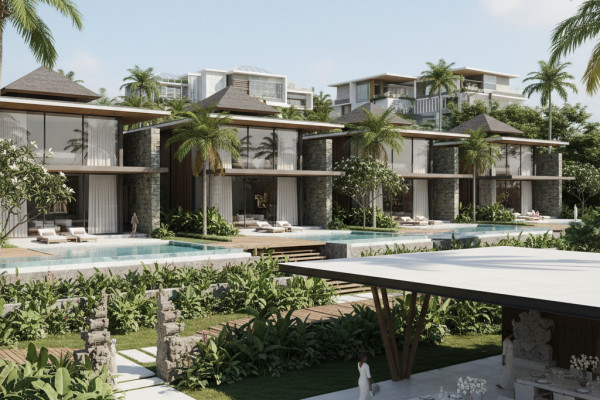
Navigating Overtourism: What Bali Buyers and Investors Need to Know Now
Bali draws families and digital nomads and investors who want to live there because of its global popularity. The rising number of tourists creates practical effects which require buyers and investors to develop better understanding of the real estate market.
The BASAibu community initiative brought together local opinions about Bali's future tourism development through their initiative. The local population expresses strong worry about overtourism because it creates excessive visitor numbers which damage both local infrastructure and cultural heritage. The tourist areas of Canggu and Ubud and Seminyak experience growing traffic problems and environmental degradation and changing residential environments. The real estate market faces direct effects from these changes because they affect property market demand and rental income and residential quality of life.
What’s new? The official 2024 statistics show foreign tourist arrivals reached 4.7 million during the first nine months of the year which has pushed these popular destinations past their capacity limits. The growing number of visitors threatens to erase local traditions while creating problems with transportation systems and waste management and basic service delivery. The rental market will experience more volatility because of tourism growth while infrastructure development will experience delayed or irregular progress.
The collected local opinions show that fast-paced infrastructure growth has replaced natural green areas with commercial areas which now present Balinese traditions as commercial attractions. Yet, solutions are emerging. The KERTHI SmartTourism platform uses artificial intelligence and blockchain technology to distribute visitors across Bali while promoting sustainable tourism options. The distribution of tourists between Seminyak and North Bali and other lesser-known destinations would reduce traffic congestion and minimize environmental damage.
Property buyers need to understand the current market conditions because they affect their investment decisions. The Canggu area continues to attract villa buyers who want trendy cafes and co-working spaces and beach access but they must deal with traffic congestion. Families who want to live in managed environments with good schools choose to reside in Sanur or Nusa Dua even though these areas cost more than USD 500k. The wellness-focused retiree and nomad population finds appeal in Ubud because of its rice-terrace views although rental market demand in this area follows seasonal patterns.
The average price for modern villas in Canggu reaches IDR 4 billion which equals USD 270k for smaller units but freehold properties with larger sizes can cost up to USD 600k. The standard duration for leasehold agreements (hak sewa) extends from 25 to 30 years but buyers need to examine renewal terms because tourism policy changes might impact property permits and land usage.
The construction of new infrastructure faces delays because of over-tourism while utility services become less reliable which investors and buyers need to include in their financial projections. Knowledge of IMB permits and Balinese cultural rules (awig-awig) helps investors avoid costly legal problems.
The following strategies help investors protect their investments from tourism-related risks. Property buyers should perform complete background checks on their properties and developer histories. Property owners should work with experienced property managers who track tourism patterns to make rental strategy adjustments. Investors who want to reduce their exposure to local tourism problems should spread their investments across different areas of Bali.
Practical Takeaways for Buyers & Investors:
- Canggu villa buyers who spend USD 300k need to calculate their future lease expenses while studying traffic patterns to create realistic rental projections.
- Families who want to spend USD 500k or more should choose Sanur or Nusa Dua because these areas provide stable infrastructure and excellent schools and a balanced lifestyle.
- Investors should monitor the development of ecotourism areas which KERTHI SmartTourism promotes because these areas show promise for investment success beyond popular tourist destinations.
- Property owners must check their IMB permits and follow local awig-awig rules to safeguard their property rights and maintain community peace.
The island market of Bali offers investors who study local conditions and smart tourism projects the chance to achieve profitable returns while experiencing its cultural heritage and lifestyle.




